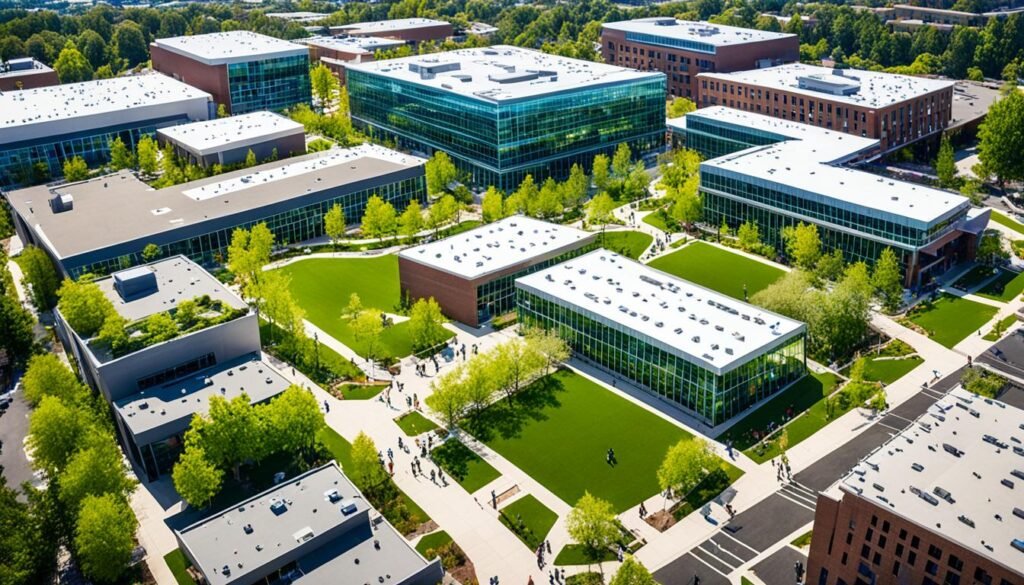In today’s rapidly evolving job market, postsecondary education has become increasingly crucial for securing rewarding careers and achieving professional success. Whether you’re a recent high school graduate or an adult learner, the array of postsecondary education options available can be both exciting and daunting. From community colleges and four-year universities to trade schools and online programs, the pathways to unlocking your future are vast and diverse.
Postsecondary education encompasses a wide range of tertiary education opportunities that extend beyond the secondary education level. These include vocational training, certificate programs, associate degrees, bachelor’s degrees, and even graduate studies such as master’s degrees and doctoral degrees. The postsecondary education landscape is constantly evolving, with innovative and equitable pathways emerging to meet the needs of an increasingly diverse student population.
Key Takeaways Postsecondary Educations
- Postsecondary educations encompasses a wide range of options beyond high school, including community colleges, four-year universities, trade schools, and online programs.
- The majority of good jobs now require some form of career-connected postsecondary education and training.
- Postsecondary education can lead to the attainment of industry-recognized credentials and in-demand jobs, setting students up for long-term career success.
- The Department of Education is committed to ensuring all students have access to innovative college and career pathways that integrate high schools, colleges, careers, and communities.
- Exploring the diverse postsecondary education options can help unlock your future and propel you towards your academic and professional aspirations.
Introduction to Postsecondary Education
Postsecondary education encompasses a wide range of education options that can be pursued after earning a high school diploma or GED. These include community colleges, trade schools, and four-year universities. Postsecondary education is not required by law like secondary education, and people can choose to pursue programs to advance their general learning, prepare for a specific career, or develop a certain skill set.
What is Postsecondary Education?
Postsecondary education, also known as tertiary education, refers to all forms of education that occur after the completion of secondary education. This includes a variety of educational institutions, programs, and credentials that individuals can pursue to develop advanced knowledge, skills, and expertise.
Importance of Postsecondary Education
Pursuing postsecondary education can provide numerous benefits, including enhanced career prospects, increased earning potential, personal growth, and the opportunity to develop specialized knowledge and skills. In today’s job market, many good-paying jobs require some form of postsecondary credential, making it increasingly important for individuals to seek out these educational opportunities to achieve their professional and personal goals.
Types of Postsecondary Education Institutions
The types of postsecondary institutions include vocational/trade schools, community colleges, and colleges/universities. Vocational/trade schools provide career-focused training for specific professions, community colleges offer associate degrees and certificates, and colleges/universities provide bachelor’s, master’s, and doctoral degree programs, including online options.
Depending on an individual’s goals, needs, budget, and time constraints, they may choose to pursue different types of postsecondary education programs, such as a vocational school, trade school, community college, or four-year university. Some may also opt for distance learning or online programs to accommodate their life skills and continuing education needs.
Unlocking Career Success: Pathways to Postsecondary Education

The Unlocking Career Success interagency initiative aims to reimagine how the nation’s high schools prepare all students to thrive in their future careers by blurring the lines between elementary, secondary, and postsecondary education, college, and careers. The Department of Education is partnering with the White House and Departments of Labor and Commerce to engage and mobilize employers and build strong education-to-employment strategies, policies, and programs aligned to regional economic needs.
Dual Enrollment Programs
The Department supports dual enrollment programs that allow high school students to earn college credit, and is using ARP ESSER funds to expand access to these programs, especially for disproportionately impacted students.
Work-Based Learning Opportunities
The Department also aims to expand access to work-based learning programs that connect academic learning to real-world applications and help students generate income, establish future earning potential, and connect with professionals. To help create and enhance high-quality work-based learning programs, the Department is participating in the Career Z Challenge.
Earning Workforce Credentials
Additionally, the Department is helping states and districts identify workforce credentials with labor market value, expand opportunities for students to earn these industry-recognized credentials, and eliminate barriers to credential attainment.
Career Advising and Navigation
The Department believes every student should leave high school with clear career goals and the knowledge and resources to pursue them, which is why it is working to increase access to career advising and navigation programs that provide information about career exploration, financial aid, and support for completing CTE programs. The Department also recognizes the importance of providing robust pre-employment transition services for students with disabilities to ensure an inclusive and accessible educational experience and a successful onramp to the workforce.
Exploring Community Colleges

Community colleges play a vital role in providing affordable and accessible postsecondary education opportunities. These institutions offer a range of programs and benefits that cater to the diverse needs of students.
Benefits of Community Colleges
Community colleges are known for their open admission policies, which means they do not have selective enrollment requirements. This makes them an attractive option for students who may not meet the stringent admission criteria of four-year universities. Additionally, community colleges are generally more affordable than larger four-year institutions, making higher education more accessible for those with limited financial resources.
Associate Degree Programs
Community colleges primarily offer two-year associate degree programs, which provide a solid foundation in general education as well as specialized coursework in a particular field of study. These programs can prepare students for entry-level positions in the workforce or serve as a stepping stone toward a bachelor’s degree by allowing them to transfer their credits to a four-year university.
Transfer Opportunities
One of the key benefits of attending a community college is the opportunity to transfer credits earned toward a four-year degree program. Many community colleges have established articulation agreements with four-year universities, making the transfer process seamless and ensuring that students can apply their associate degree credits toward a bachelor’s degree program.
Colleges and Universities

Colleges and universities are educational institutions that offer four-year undergraduate bachelor’s degree programs, as well as more advanced graduate degree programs like master’s and doctoral degrees. Bachelor’s degree programs typically take four years to complete and include general education courses along with a depth of study in the student’s major or focus area. After completing a bachelor’s degree, students may continue at the university level to earn a master’s or doctoral degree to acquire expert-level knowledge within a specific field of study, which can unlock career advancement or teaching opportunities.
Online Learning Options
In recent decades, distance learning and online degree programs have grown in popularity at colleges and universities, providing flexible and affordable options, especially for working adults, frequent travelers, and those with family responsibilities.
Graduate Degree Programs
After completing a bachelor’s degree, students may choose to pursue more advanced graduate degree programs, such as master’s and doctoral degrees, to acquire specialized knowledge and skills within a specific field of study. These graduate studies can unlock career advancement opportunities or prepare students for teaching roles in their chosen discipline.
Bachelor’s Degree Programs
Bachelor’s degree programs at colleges and universities typically take four years to complete and provide a well-rounded education, including general education courses as well as in-depth study in the student’s selected major or area of focus. These four-year degree programs can prepare students for a variety of real-world careers and serve as a foundation for further graduate studies.
Vocational and Trade Schools

For high school graduates seeking to quickly enter the workforce,
vocational or trade schools offer an excellent career-focused training option. These specialized institutions are often responsible for preparing professionals in fields like plumbing, electrical work, and other skilled trades that require a specific set of technical skills.
Career-Focused Training
Vocational and trade school programs are typically completed in under two years, qualifying students to work in their chosen profession without the need for additional education. By operating under an intensive, career-focused curriculum, these institutions provide the specialized training and industry-recognized credentials needed for in-demand skilled trades positions.
Industry-Recognized Credentials
Upon completing their studies, graduates from vocational and trade schools earn the professional certifications and industry-recognized credentials that employers in the plumbing, electrical, and other skilled trades fields value. This hands-on, specialized training equips students with the expertise to excel in their chosen careers immediately after graduation.
Alternative Postsecondary Learning Options

In addition to traditional degree and certificate programs, postsecondary institutions offer a variety of alternative learning options for students seeking to develop new skills, gain personal enrichment, or advance their career.
Non-Degree Programs
Non-degree students can enroll in individual single courses without pursuing a full academic degree, allowing them to explore new topics or hone specific life skills at their own pace. These flexible options cater to those with busy schedules, unique learning needs, or a desire for continuing education without the commitment of a degree program.
Continuing Education and Professional Development
Even after earning a postsecondary credential, individuals can continue their educational journey through professional development and continuing education programs. These offerings enable professionals to acquire more specialized skills, fulfill recurring training requirements, or gain the knowledge needed for career advancement. Many employers provide tuition assistance benefits to support their employees in pursuing these enrichment opportunities.
Qualifications and Admissions for Postsecondary Education

The primary requirement for admission to most postsecondary education programs is holding a high school diploma or GED equivalent. Colleges and universities may also consider an applicant’s grade point average (GPA) and standardized test scores, depending on the institution’s admissions criteria. Other common requirements include being at least 16 years old, being a U.S. citizen or permanent resident, not having been expelled from a previous institution, completing all application forms, and submitting official transcripts from any previously attended colleges or universities. The specific admissions requirements can vary depending on the type of postsecondary program and the goals and competitiveness of the institution.
| Admission Requirement | Description |
|---|---|
| High School Diploma or GED | The primary prerequisite for most postsecondary education programs |
| Grade Point Average (GPA) | Colleges and universities may consider an applicant’s academic performance |
| Standardized Test Scores | Admission criteria may include SAT, ACT, or other standardized test results |
| Citizenship | Applicants are typically required to be U.S. citizens or permanent residents |
| Transcripts | Official transcripts from previously attended colleges or universities |
| Application Forms | Completion of all required application materials by the deadlines |
The specific admissions requirements can vary depending on the type of postsecondary program and the goals and competitiveness of the institution. It is important for prospective students to carefully review the admission criteria for their desired postsecondary education programs to ensure they meet the necessary qualifications.
Financing Your Postsecondary Education

Affording a postsecondary education can be a significant financial undertaking, but there are various financial aid options available to help make it more accessible and affordable for students. Exploring these opportunities can open the door to achieving your educational and career goals.
Financial Aid Options
Financial aid includes a variety of resources, such as scholarships, grants, and student loans. These options can help cover the costs of tuition, fees, and other education-related expenses.
Scholarships and Grants
Scholarships and grants are forms of financial aid that do not require repayment. They can be awarded based on criteria like academic merit, financial need, or other specific requirements set by the postsecondary institution or external organizations. These non-repayable funds can significantly enhance the affordability of your postsecondary education.
Student Loans
In contrast, student loans must be repaid, but they can provide the necessary financial resources to cover educational costs. These loans, offered by the federal government, postsecondary institutions, and other lenders, can help ensure accessibility to postsecondary education for those who may not have the financial means to pay upfront.
By exploring these various financial aid options, students can find the right combination of scholarships, grants, and student loans to make their postsecondary education more affordable and accessible.
Also Read : Unlock Your Future with Postsecondary Education
Conclusion
Postsecondary education offers a vast array of opportunities for individuals to pursue their academic and career aspirations, whether through community colleges, four-year universities, vocational/trade schools, or alternative learning options. By understanding the diverse range of postsecondary institutions and the available qualifications and financial aid, students can unlock their future and find the ideal path to achieve their goals.
The Department of Education is committed to ensuring that every student has access to innovative college and career pathways that integrate high schools, colleges, careers, and communities. These pathways are designed to lead to the attainment of industry-recognized credentials and in-demand jobs. Through strategic initiatives, partnerships, and targeted funding, the Department aims to dramatically increase the number of Americans who possess a postsecondary credential and connect the education and workforce systems to create new opportunities for all students to succeed.
By embracing the accessibility and affordability of postsecondary education, individuals can embark on the journey towards career success and unlock the boundless possibilities that lie ahead. The Department of Education’s unwavering dedication to enhancing postsecondary education, career success, pathways, opportunities, accessibility, and affordability serves as a guiding light for those seeking to transform their lives and contribute to the prosperity of our nation.
FAQs
Q: What is post-secondary education?
A: Post-secondary education refers to education that takes place after completing high school. It includes various options such as universities, technical schools, colleges, and other programs beyond the secondary level.
Q: What types of education are considered post-secondary?
A: Post-secondary education includes universities, technical schools, colleges, and any programs that offer education beyond the high school level.
Q: How is accreditation important in post-secondary education?
A: Accreditation ensures that a post-secondary institution meets certain quality standards and that the education provided is recognized by employers and other institutions. It is important for students to attend accredited programs to qualify for various opportunities.
Q: Why is it important to qualify in post-secondary education?
A: Qualifying in post-secondary education opens up opportunities for further study, career advancement, and better job prospects. It equips individuals with the necessary skills and knowledge to succeed in their chosen field.
Q: What are the different kinds of post-secondary education options available?
A: Post-secondary education options include universities, technical schools, community colleges, private institutions, and publicly funded institutions offering undergraduate and graduate programs.
Q: Are there specific programs designed to boost minority participation in post-secondary education?
A: Yes, there are programs aimed at increasing access to post-secondary education for minorities, low-income students, and other underrepresented groups. These programs provide support and resources to help individuals pursue higher education.
Q: What are the benefits of attending universities and colleges for post-secondary education?
A: Universities and colleges offer diverse programs, resources, and opportunities for students to enhance their knowledge and skills. They provide a pathway to specialized fields and professional development.
Source Links
- https://www.ed.gov/raisethebar/postsecondary-pathways
- https://www.phoenix.edu/blog/what-is-postsecondary-education.html
- https://www.ed.gov/raisethebar/pathways-for-global-engagement




